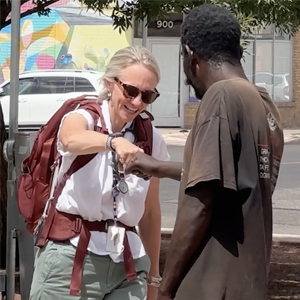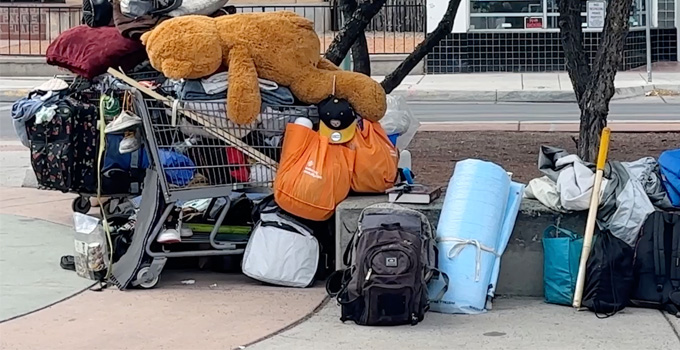“Do you have any chest pain right now? Any shortness of breath?”
The patient shakes her head as medical provider Lindsay Fox, MSPAS, PA-C, places her hands on the woman’s ribs. Fox is a physician assistant with The University of New Mexico’s Department of Internal Medicine within the School of Medicine.
“Okay, so what I'm checking for now is to make sure that when you breathe your ribs expand,” Fox said. The woman waits patiently as the exam continues.
This interaction isn’t happening inside a clinic or a hospital room. It’s happening outside on the street, in the blistering summer heat, near Robinson Park at 8 th and Central in northwest Albuquerque. The woman being treated doesn’t have a home.
A quick online search of Robinson Park advertises the popular Downtown Grower’s Market that takes over the space every weekend in the summer months. But on a weekday, the allure of fresh food, art, and music is gone. This becomes a place where a community of people who don’t have much seek shelter.
“Folks have been congregating here because it's a centralized area, but it also provides a lot of shade. They're living in tents in the park,” Fox said.
Solving homelessness isn’t a new issue for Albuquerque, but it is an issue that’s growing. Earlier this year New Mexico lawmakers received a report from the Legislative Finance Committee [PDF] indicating that homelessness in the state had increased by nearly 50%, with half of those people living in Albuquerque.
The Work of Street Medicine from UNM Health Sciences on Vimeo.
Street Medicine
In addition to her work at UNM with patients and medical students, Fox is also the director of medical services for ABQ Street Connect (ABQSC). ABQSC is a housing-first collaborative outreach focused on helping people who are experiencing homelessness in dire need of care and getting them into homes.
“We're constantly thinking about how best to serve people,” Fox said. “The folks we serve are the highest acuity, those most likely to die on our streets.”
Fox said one way to do that is through street medicine. Fox and her team go out and find the most vulnerable people living on Albuquerque’s streets. They work to build relationships and trust, offering immediate care and support services with the ultimate goal of helping people find permanent housing.
Now programs like Street Medicine are getting more support. UNM’s School of Medicine’s Dept. of Internal Medicine along with General Internal Medicine (GIM) wrote and received a $250,000 grant from the New Mexico Department of Health. That money will be used to expand services under the new Center for Inclusive Health at UNM which will provide mobile medicine and clinical services with agencies like ABQSC.
In addition, UNM Health, along with the help of a private donor, contracted with the internationally recognized Street Medicine Institute (SMI) to provide consulting services to help build and sustain the program here in Albuquerque.
How Street Medicine Works
Fox and the team from ABQSC work closely with the City of Albuquerque, Albuquerque Police Department, UNM Emergency Department, UNM Department of Psychiatry and Behavioral Sciences and other managed care organizations to identify people in critical need of housing and social services. Fox is also supported by entire teams within UNM’s Health system.
“That’s why I love UNM. I'm not out here by myself. I have that entire university I can call on to help me every single time. No matter who answers that phone, they consult with me to ensure that the patient gets the treatment they need with dignity and compassion,” Fox said.
A Day On the Street
On this particular day, it was a call from the city about Robinson Park that had Fox hopping into her Subaru with her giant backpack full of supplies. Her ABQSC team was also enroute.
In the car, Fox talked about what it’s like interacting with a diverse group of people with a wide variety of needs, who aren’t always the most willing to receive help.
“One of the things I start thinking about when I first engage with people is-- ultimately what's best for them? Maybe what's best for them right now may not be what's best for them in 18 months, but I think what we have to start thinking about is not everybody needs to go into a single-family home. Some folks might do better in a group home. Some folks might do better in a system that provides complete wraparound services, and we have a couple of those in Albuquerque.”
When Fox gets to Robinson Park, she’s alerted to a group gathered just across the street. The perimeter of the large, paved area is lined with rolled up sleeping bags, backpacks, and overflowing shopping carts; a giant teddy bear lies across the top of one. A couple of Albuquerque police officers nearby explain they’ve been trying to get the group to move out of the area since earlier that morning.
By now it’s a little after 10 a.m. and it’s hot. It’s not safe. Fox says she’s encountered a lot of people on the street with severe burns from laying down or sleeping on the cement.
“Morning guys, I'm Lindsay with Street Connect and UNM. I think I met some of you last week. I'm just checking in on you. You guys feeling okay today?”
Fox is met with resistance, even some hostility at first. One man who is sitting underneath a blanket curses at her – telling her to back off. You can feel the tension, but Fox is undeterred, moving respectfully and seamlessly through their community, offering medical supplies and evaluations.
“When we go to this park, we're going into their world and we have to respect that,” Fox said.
“I can't just say ‘this what you need to do, and this is how we're gonna solve it.’ A lot of folks that are unhoused have resilience and personal strengths that I can't even begin to imagine. So, it’s about learning from them-- what their needs are and what their concerns are. What's important is to listen to what's important to them first and work from there.”
And what was important to this group at that moment was an art project. Fox finds the woman in charge—the leader of this community.
The woman instantly recognizes Fox and asks her to check her out. She’s been having pain. She hasn’t been able to sleep. Fox checks her out and gives her some ibuprofen, “You can take two tabs every eight hours.”
Then the woman explains the art project she and her friends are working on. They are going to paint a mural along the cement walls. She tears up expressing that this means everything to her and explains she was given permission by the city to make this happen. Fox listens and empathizes while remaining focused.
“This is my neighborhood,” Fox told her, “So, I’m excited you are doing this. I'm just really worried about your folks out here doing the mural because it is so hot. If it’s 95 degrees, this pavement is 112 degrees.”
Fox went on to discuss some housing options with the woman, but in that moment, the woman is focused solely on the project and what she perceives as bullying from the police. She begins crying and yelling.
After calming her down, Fox asked her if she was hungry and if she’d like something to eat. The tension eases a bit. The woman’s eyes soften.
“I think she's easily triggered. I think she's hungry,” Fox said. Fox bought the woman a breakfast burrito.
“Street medicine is based on meeting the patient where they are, meeting them on their terms, and reducing any power dynamic. We want to keep the power with the patient and allow them to remain in the center,” Fox said. “You know, there's probably a lot of other things medically that she might need, but what she needs right now is food, safety, water, shelter, and that's critical. As a medical provider, I have to be understanding of that. If a burrito will make the situation better, then that's better than any pill I might prescribe.”

As a medical provider, I have to be understanding of that. If a burrito will make the situation better, then that's better than any pill I might prescribe.
Fox smiled, “I mean, I know I’m a fussy pants when I’m hungry.”
While not knowing specific details about that art project, Fox said the project itself does matter.
“It matters because it matters to her. If that makes her feel more incorporated into the community, let's figure out how we can do this.”
That day Fox and her team were able to work collaboratively with Albuquerque Police to ease tension within the group. They provided medical supplies and food and, most importantly, a couple of hotel rooms for a few people in that group, including the woman leading the project.
“We were able to say, ‘Hey, look, we honor the work you want to do here, but let's get you somewhere where it's air conditioned where you can rest. You can be safe.’”
Collector of Stories
At the end of the day Fox calls herself a collector of stories, trying to take the time to see each person she interacts with as an individual.
“We live in a fear-based society right now that's done a really good job of ‘othering’ people. You diminish people's humanity that way. People on the street are people. They might be a mom, might be a kid; you have to remember that a lot of people are just doing the best they can and that they are human. Could they be doing better? I don't know. That's not for me to judge. Do we have the capacity as a society to help people. Absolutely.”
Fox shares that message with her students. “It’s great to know biology, but I want you to know what it means to be a human. If you don't know what it means to be human, then you better figure it out because what we're treating out here is not biology but we’re treating human beings.”
“It’s an honor. I get to collect all these beautiful stories,” Fox said. “They inspire me.”
The woman leading the art project that day inspired her.
“It's really hard to live on the street, but when you see her trying to make something beautiful, out of absolute chaos, you can respect that. She's like, ‘I'm gonna make something pretty’ and she's willing to fight for it. Well, all right, girl!”
____
More Information: Street Medicine Institute Visit
The team from the internationally recognized Street Medicine Institute will be in Albuquerque beginning August 23rd to consult on building and expanding Albuquerque’s Street Medicine Program. A Grand Rounds presentation with experts from the Street Medicine Institute will be held Thursday, August 24th from 12:30p-1:30pm at Domenici Auditorium and via Zoom.
